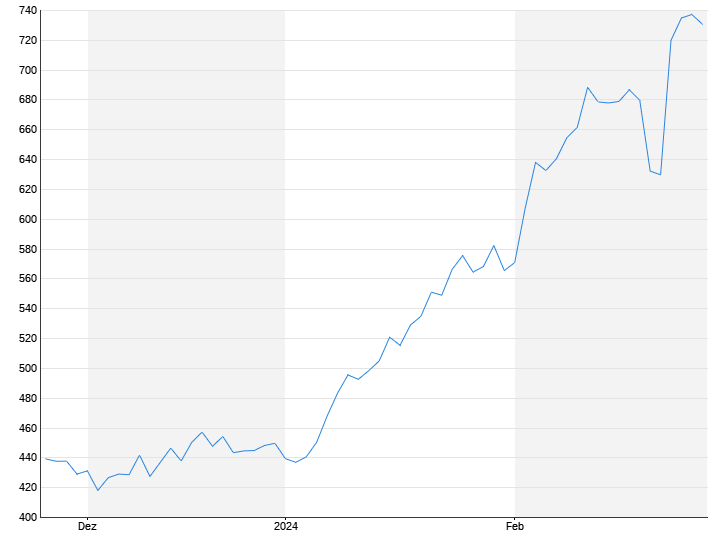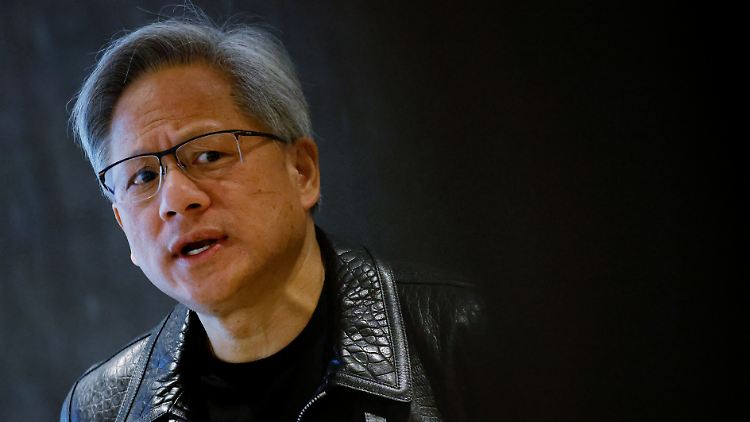Person of the week
Forget Musk, Bezos and Zuckerberg – Huang is the new tech superstar
By Wolfram Weimer
February 27, 2024, 10:22 a.m
Listen to article
This audio version was artificially generated. More info | Send feedback
Nvidia is the tech company of the year. The AI specialist and chip manufacturer is triggering a stock market frenzy and is now worth two trillion dollars – more than all DAX companies combined. Its founder and CEO makes startling predictions.
The stock market frenzy is unprecedented. The value of Nvidia shares rose by $277 billion in just a single day last week. Never in history has a single company gained so much in 24 hours. For comparison: That’s 20 times the entire Commerzbank – in one day and that’s just as an increase. Because the Nvidia stock market run has been going on for a few months. The market capitalization has now reached the astronomical mark of $2 trillion. The company from Santa Clara, California is now worth more than all 40 German DAX companies combined.
Among investors and speculators, Nvidia shares are currently being celebrated as a pop star of tech capitalism, in a sense as Taylor Swift for investors. Anyone who had bought Nvidia shares for just $1,000 in 1999, when the company went public, would now be a millionaire three times over.
The trigger for the latest price fireworks is the chip manufacturer’s quarterly figures. The quarterly profit jumped from $1.4 billion a year ago to $12.3 billion now. Quarterly sales shot up to $22.1 billion, three times higher than the previous year.


With its graphics cards, software and super chips, Nvidia is the driver and beneficiary of the AI revolution. The Nvidia processors have the advantage over the competition in that they can carry out a large number of computing operations at the same time. This is mandatory for artificial intelligence programs like ChatGPT; From gaming to NASA satellite control and autonomous driving to Bitcoin mining, Nvidia chips are needed. The competition from AMD and Intel is currently lagging behind Nvidia technologically.
Worth more than Amazon
Since Nvidia is now leaving even market giants such as Amazon, Meta (Facebook), Alphabet (Google) and Tesla behind in terms of market value, eyes in the global tech industry are turning to its founder and CEO Jensen Huang. Elon Musk, Mark Zuckerberg and Jeff Bezos are suddenly no longer as cool as the Taiwanese-American Nvidia hero.
Jen-Hsun (Americanized Jensen) Huang was born in 1963 and is different from the other tech titans. He sometimes shows up in a muscle shirt and likes to present himself in leather jackets. He got a tattoo of the Nvidia company logo on his upper arm when the share price exceeded $100 four years ago. Today the stock costs almost $800. The tattoo and the black leather jacket give the impression of a rebellious rocker aesthetic. But Huang doesn’t want to know anything about it. When asked what he thinks of his status as a fashion icon, he replied: “Don’t come across like that. I’m happy that my wife and daughter dress me.” Incidentally, the tattoo “hurt like hell” and he would never do something like that again. He wants to “age gracefully” without further tattoos.
Huang was born in Tainan, southwestern Taiwan. His family lived in Thailand for a while and then emigrated to the USA. Huang received his bachelor’s degree in electrical engineering in 1984 and his master’s degree in electrical engineering in 1992 from Stanford University. After college, he worked at LSO Logic and at chip manufacturer AMD. On his 30th birthday, February 17, 1993, he founded Nvidia Corporation with Chris Malachowsky and Curtis Priem – two ex-Sun Microsystems employees. The three founders dreamed of futuristic computers with accelerated, graphics-oriented chips. They were initially seen as gamers and chip tinkerers for video game consoles and burned through the first ten million in start-up capital.
Huang is driving the AI revolution
Today, Huang sums up the wild years of development and his mistakes: “You know, every company makes mistakes, and I make a lot of them. And some of them put the company in danger, especially in the beginning, because we were small and had a lot of problems , very large companies, and we were trying to invent this brand new technology… At times we barely knew what we were doing. When you do something that’s never been done before, you don’t know exactly what you’re doing . On the other hand, there are these huge companies that don’t want you to disrupt the industry. And so we made some product mistakes in the beginning. There were also some strategic mistakes that I made. To be honest, there were a lot of them of it. Above all, I tried to ensure that the company remembers the lessons we learned from the mistakes.”
Huang is now a billionaire thanks to his company shares. His compensation as CEO last year was $21.4 million. Huang clearly enjoys driving the AI revolution forward. In a TV interview with CNBC, Huang announces the construction of the world’s most powerful supercomputers. These will be needed for molecular dynamics simulations, climate science research, materials science research and quantum computer research. Above all, the new generation of artificial intelligence needs dynamic processors like those developed by Nvidia. “I remember delivering my first-ever AI supercomputer. I personally delivered it to OpenAI. It was the world’s first-ever AI supercomputer.” Today OpenAi is world-famous for its software product ChatGPT.
Huang sees the tech industry in the fourth revolution, which is now continuing into a permanent revolution: after the PC revolution came the Internet revolution, then the cloud revolution and now the AI revolution. His prediction: “In each of these transitions, it is very unlikely that the companies that were big before will still be big afterward. But there are some companies that have managed to remake themselves along this path because of their adaptability and agility “We had to reinvent ourselves with each of these technological revolutions.” He also takes this credo personally. Why shouldn’t a human mutate into a robot, he asks.
When asked how long he plans to be Nvidia’s CEO, he said he believes he can do good work in his human form for another 30 years, and then: “In another four decades I’ll be a robot and maybe three or four decades later. So I hope I can enjoy this for a very long time.”

